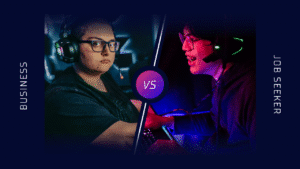Business or Job? The Crossroads of Every Middle-Class Dream
As soon as I got my degree, I wasn’t looking for just a job. My mind was buzzing with fresh ideas—startups, business models, Goobjoog-level innovation (yes, Google-like dreams were our toys). We wanted to make Warren Buffett pause and say, “Who are these people?” From Infosys’ Narayana Murthy to Ola’s Bhavish Aggarwal, the stories of three generations of entrepreneurs were like Eastman Color movies to us—vibrant, inspiring, cinematic.
With that fire in my heart, I placed a business proposal in front of my father.
Picture this: he’s sitting in a balcony armchair, newspaper in hand, sipping filter coffee every hour from mom’s kitchen. He’s mentally and financially preparing to retire in two years. My proposal dropped like a bombshell.

“What? You want to do business? Is this why you studied engineering?”
“Will we be able to do business? Giants are dying without direction. Even those who flew back on chartered flights have no money for tea. No, Babu!” he said, shaking his head.
What could I say? I walked out with a sigh, heading towards the Irani café down the street.
Are our fathers poor dads? Poor bookworms?
It sometimes feels like youth’s dreams are meaningless in their eyes.
This age-old debate continues: Business or Job?
The Job vs Business Tug-of-War
A business offers risk and reward. A job offers comfort and stability.
If business fails, you might never recover. A job might not make you rich, but it gives you predictable income, insurance, bonuses—and a path. If one job doesn’t work out, another one will. But with business? One wrong step can cost you everything.
That’s why our fathers (and their fathers) always advised us: “Get a stable job.” And who can blame them? They’ve seen life. They’ve seen struggle.

A job, after all, is the most accessible comfort zone.
But then again, isn’t that what every motivational book or speech tells you to challenge?
“Jobs are a temporary solution to a permanent problem.”
“Don’t be one in a hundred, be that one in a hundred.”
If our grandfathers lived in an era of Ambanis and Adanis, can’t we try too? Leaving everything to become a data entry operator at XYZ seems counterintuitive when you have the ability to create, innovate, and lead.
But let’s be real—when you come from a middle-class family and carry the weight of responsibilities, you must tread carefully.
Can Business Be Like a Job?
Yes. Business doesn’t always have to be high-risk, high-reward. It can be structured like a job.
-
Pay yourself a monthly salary.
-
Separate business finances from personal life.
-
Buy personal assets from profits, not business capital.
This way, even if the business collapses, your personal life isn’t crushed along with it.
Franchises are a great middle path. The brand is already built. The systems are in place. Risk is low. Profits are limited but steady.

Success in business is not equal to success in life.
And having a job doesn’t mean you’re someone’s slave.
Choose what gives you satisfaction. Not all journeys look the same. Some paths are professional, others entrepreneurial. But no one has the right to judge your choices. And you? Don’t devalue yourself based on someone else’s opinion.
The Hybrid Approach
What if you could take the best of both worlds?
There’s risk in business. There’s growth in jobs. And there’s also a third option: mixing them.
Take the Employee Stock Option Plan (ESOP). Some companies offer employees partial ownership based on performance and seniority. This means you’re both—an employee and a stakeholder. As the company grows, your wealth grows too.
This is how many ordinary employees have become wealthy—through business-minded employment.
If you get the chance to join such a company, don’t miss it.
And if not, choose sectors with high growth potential. Be open to change—be it your role, city, or even country. Shifting to a better opportunity can boost your income more than running your own business ever could.
But if you really want to explore entrepreneurship, start early. Take calculated risks. Fail fast, learn faster.
This is the meaning of doing a job with a business strategy.
Final Thought:
Business like a job. Job like a business.
That’s the sweet spot.
Even tech giants like Satya Nadella and Sundar Pichai are employees. But they’ve played their roles with vision and ownership—traits often attributed to entrepreneurs.
So the next time someone asks: “Job or business?”
Maybe, just maybe, your answer can be: “Both.”
✨ About Me
Hi! I’m Manikanta Reddy, a passionate finance enthusiast with a strong understanding of money management, personal finance, and smart investment strategies. I believe financial literacy is the foundation of a secure and stress-free life — and I’m here to share practical insights, real-life examples, and simplified advice to help you make better financial decisions.
Whether it’s choosing between paying off a loan or investing, building emergency funds, or planning for retirement — I love breaking down complex topics into easy, actionable tips that anyone can follow.
Let’s learn, grow, and build wealth — the smart way. 💰






1 thought on ““Business or Job? Finding the Middle Path Every Indian Youth Should Know””